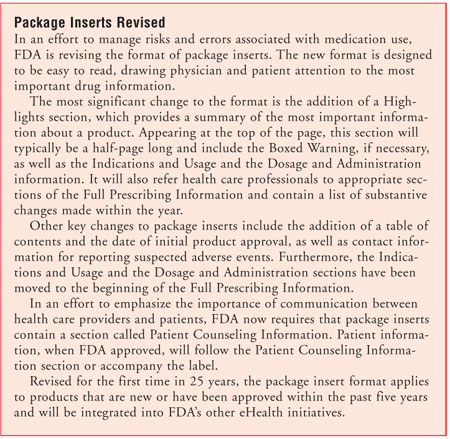US
Pharm. 2006;2:58.
Public Health Advisory
Issued for Ketek
Following reports
linking sanofi-aventis' Ketek (telithromycin) tablets to serious liver
problems, FDA has issued a public health advisory for the antibiotic. The
agency, which is investigating whether labeling changes or other actions are
necessary, is advising that health care professionals and patients adhere to
the following recommendations:
•Health care professionals
should monitor patients taking telithromycin for signs and symptoms of liver
problems, and patients who develop evidence of liver problems should
discontinue the drug;
•Patients who take
telithromycin and do not develop evidence of liver problems should continue
taking the drug unless their health care provider directs otherwise;
•Patients who develop
symptoms of jaundice should contact their health care professional
immediately; and
• Telithromycin should
be used only for infections caused by susceptible microorganisms.
According to the January 20
Annals of Internal Medicine, three patients taking telithromycin developed
jaundice and abnormal liver function, with one patient recovering, one
requiring a liver transplant, and one dying. Two of the patients reported some
alcohol use, and all three received treatment from physicians in the same
geographical area.

Cancer Warnings Added to Eczema
Drugs' Labeling
FDA recently
approved updated labeling for two topical eczema drugs, Novartis' Elidel
(pimecrolimus) cream and Astellas' Protopic (tacrolimus) ointment. The
labeling now contains boxed warnings about a possible risk of cancer
associated with the drugs and a patient Medication Guide. The labeling states
that the treatments are intended as second-line therapies and that children
younger than 2 years should not use them.
Although a causal link has not
been established, rare cases of cancer have been reported in patients taking
these drugs. Last February, FDA's Pediatric Advisory Committee recommended
updating the labeling and adding Medication Guides for the medications, and
FDA issued a public health advisory the following month.
The boxed warnings explain
that long-term safety of the medications has not been established. Although
the drugs' manufacturers are studying the possible cancer risk, it could take
years before research is concluded.
--Abigail Brugger
To comment on this article, contact editor@uspharmacist.com.






